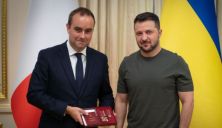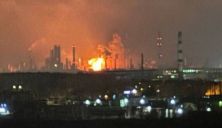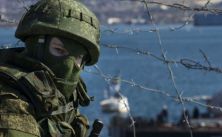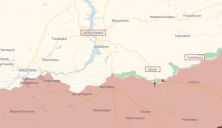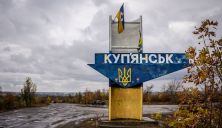Russia is no longer in the top ten largest economies in the world. This was, in particular, affected by the fall of the ruble as a result of the introduction of sanctions. After the EU Council adopted the fourteenth package of restrictions, it became more difficult for the Russian Federation to implement shadow schemes to bypass them, FREEDOM reports.
The imposed sanctions against Russia will lead to a sharp decline in the Russian economy as early as 2025. Ukrainian President Volodymyr Zelenskyy stated this in an interview with The Philadelphia Inquirer.
“Let’s see what Russia makes money from. Their economy is oil and gas. And no matter what, no matter what anyone says or draws this or that economic analysis, real professional people agree that, starting in 2025, Russia will fall economically. That is, sanctions are gradually starting to work. Gradually, its energy money is not enough to produce such large quantities of weapons and provide for the population,” Zelensky said.
Restrictions are leading Russia to a demographic crisis, and the standard of living of the population is falling catastrophically. Because of this, the State Duma is preparing a bill to ban “childfree ideology.” The Russian Ministry of Justice calls the deliberate refusal to have children “extremist-oriented.”
Russian officials urge their citizens to work more and identify three restrictions that are currently slowing down economic growth: labor shortages, limited access to technology and long-term investments. But this is not the entire list, analysts say. Sanctions hit the main arteries of the Russian economy – the sale of oil and gas. Income from trade in them has always been a key source of income for the aggressor country.
“Now, I think, the most unpleasant sanctions are against the Russian tanker fleet. This requires more effort. Before the war, about 80% of Russian oil that moved by sea was handled by Western ships. And in the spring of 2022, the Russian Federation began to assemble new ships. And now more than 70% of Russian oil that goes by sea comes from the so-called shadow tanker fleet. This measure [sanctions against Russian courts] is very important, it puts a lot of pressure on the budget of the Russian Federation,” said Elina Rybakova, director of the Kyiv School of Economics for international programs, in an interview with Forbes Ukraine.
Russia is no longer in the top ten largest economies in the world – this is evidenced by the corresponding rating. The income of Russian companies fell by a third: minus 36% for 2023. All enterprises of the aggressor country earned 814 trillion rubles last year – that’s about 9 trillion dollars at the current exchange rate. Moreover, back in 2022, the income of Russian companies amounted to approximately $14 trillion – again at the current exchange rate. This is data from the analytical portal of the Federal Tax Service of Russia.
“The financial system of the Russian Federation has now received a very good blow. The price of oil has decreased, and now the Russian Federation is submitting amendments to the budget regarding an increase in the budget deficit, because they understand that the revenues that were announced at the end of last year are simply unrealistic. The price of oil, which they set at $70, is now $65. Therefore, we can say with confidence that the sanctions are working and quite effectively. No production has been able to replace imports,” said economic expert Ilya Neskhodovsky.
Russia managed to circumvent sanctions, in particular, thanks to the shadow oil fleet. After the adoption by the EU Council of the fourteenth package of sanctions, the Russian Federation will not be able to bring its ships to European ports. It is worth noting that for the first time the European Union introduced restrictions against specific vessels from the Russian shadow fleet.
Read also: Ukraine can’t arm all soldiers due to slow pace of arms delivery
Earlier, economic expert Ilya Neskhodovsky expressed the opinion that secondary sanctions could actually restrain the foreign trade of the Russian Federation.




